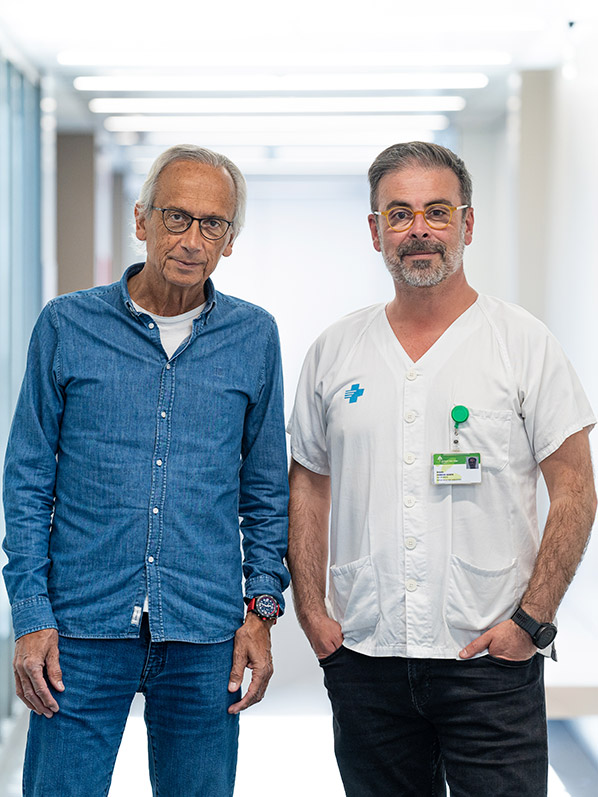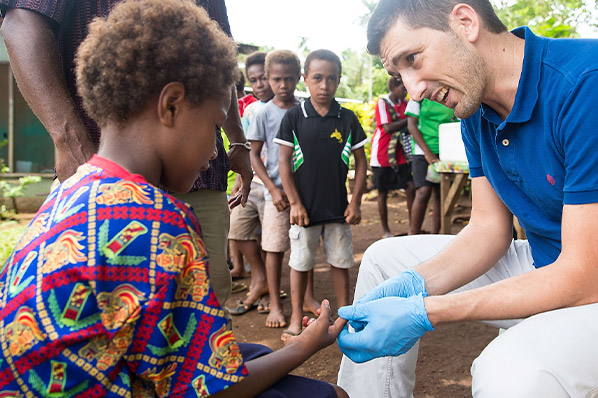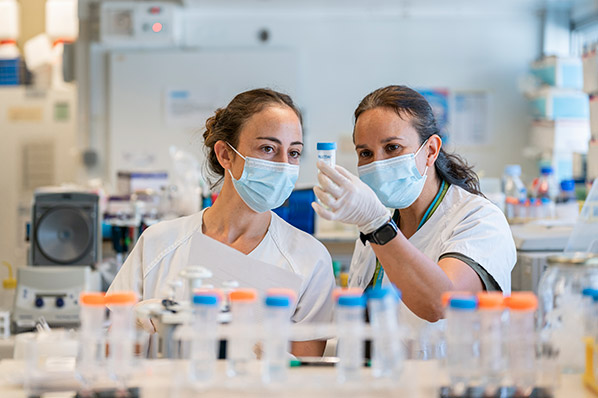DESTINATION OF FUNDS

In 1992, we founded the Fight against AIDS Foundation to combat a pandemic, that of HIV, in which we provided care for those affected and promoted pioneering and life-saving clinical research. Over these years, through gains in knowledge about the immune system, which is affected by HIV, we have been able to approach infectious diseases in all their dimensions, to the point that two years ago we became the Fight Infections Foundation.
Today, we tackle infections through six major research areas: HIV, Covid-19, sexually transmitted infections, international health, neglected diseases, serious bacterial infections, and infections in immunocompromised patients.
We conduct translational research, because we merge the basic research we do in the IrsiCaixa laboratory with the clinical research we carry out at the Fight against Infections Foundation through clinical trials involving our patients at the Infectious Diseases Service at Germans Trias Hospital. Therefore, the whole research process, both basic and clinical, is carried out in the same center.
All this research would not be possible without the contributions made by thousands of supportive individuals and companies, who have consistently shown their commitment to the science we do and global health.
I would like to convey my sincere gratitude for all this support.
However, after three decades of tireless research in the field of infections, we still have a long way to go in addressing the challenges of the present and the future. We must prepare for new potential pandemics and new biomedical challenges such as the microbiome, ageing, cancer and neurodegenerative diseases, among others.
Dr. Bonaventura Clotet

OUR RESEARCH


HIV
HIV infection remains one of the most important epidemiological challenges we face as a society. According to the Joint United Nations Program on HIV/AIDS (UNAIDS), it is estimated that in 2021 there were more than 38 million people living with HIV worldwide.
Our aim is to end HIV infections and cure those infected. Until this can be achieved, we are working to provide better treatment and prevent physical as well as psycho-emotional complications of infection.
Covid-19
Covid-19 is an infectious disease caused by the SARS-CoV-2 virus, which has affected millions of people worldwide. In September 2021, the World Health Organization (WHO) confirmed more than 4.5 million deaths worldwide.
We work to prevent COVID-19, forestall its progression and decrease mortality. We also focus on studying long COVID to find its causes and identify effective treatments.
Sexually Transmitted Infections
The WHO estimates that one in twenty-five people in the world suffers from at least one sexually transmitted infection (STI).
We are focusing on the study of preventive strategies to avoid new infections and we are looking for improved treatments, searching for new drugs and also using existing ones.
Serious bacterial infections
Bacteria are developing a strong resistance to antibiotics, which is becoming a serious threat to global health.
We are fighting bacterial infections that cause high mortality and serious clinical complications. We pay particular attention to resistant germs, to antibiotics and to the study of infections originating in the environment and the animal kingdom.
Infections in immunosuppressed patients
Immunosuppressed patients are those who, for various reasons, have weakened defenses.
We aim to reduce complications and mortality from serious infections in these patients who are more vulnerable to disease due their weaker immune system.
International health and neglected diseases
Globalisation and increasing international travel are leading to an emergence of infections being contracted in one country and diagnosed in another. These are known as imported infections.
In addition, millions of people around the world suffer from neglected or overlooked diseases – a range of infectious diseases, many of them parasitic.
We work to prevent, diagnose and treat infections related to globalisation, affecting either travellers or migrants. We also work with endemic countries to address neglected diseases.
Neurodegenerative diseases
Dementia, which is the result of various diseases and injuries affecting the brain, is the seventh leading cause of death in the world, with 10 million new cases diagnosed each year.
The most common form of dementia is Alzheimer’s, which may account for 60-70% of cases. Our research team is working to evaluate the efficacy of drugs against this neurodegenerative disease, as well as to develop new treatments.
Cancer
Cancer causes millions of deaths every year, making it the second leading cause of death in the world.
Our extensive experience with the immune system allows us to design new therapies to tackle this disease and work to provide solutions for people suffering from it.


